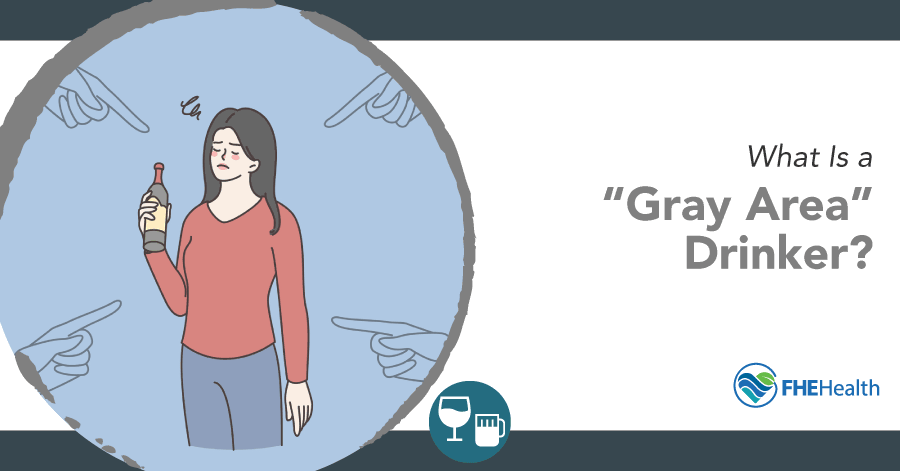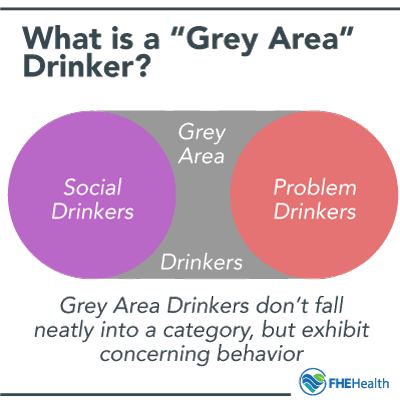
If you’re not happy with your drinking habits but don’t show the normal signs of an alcohol problem, you may be a gray area drinker. This guide reviews gray area drinking and offers advice if you’re not sure when it’s time to seek help for your drinking problem.
What Is Gray Area Drinking?
Society groups adults who drink into two categories: social drinkers and problem drinkers. Gray area drinking is a kind of drinking that doesn’t quite fit either classification and falls somewhere in the middle. While an alcoholic might find it difficult to stop thinking about where their next drink is coming from, a gray area drinker may successfully quit drinking for months or years at a time.
Gray area drinkers aren’t quite social drinkers either, because they may find themselves craving alcohol outside of social gatherings. They may also have a drink or two more than an average person would in a similar situation even though they’re not tempted to repeat the behavior the next day. Gray area drinkers are more likely to be the type of social drinker that takes it too far and needs a ride home.
What Are Signs of Gray Area Drinking?
 It can be much more difficult to detect gray area drinking because there aren’t many notable symptoms. Alcoholics usually have an intense desire to drink as a coping mechanism for dealing with stress, depression, anxiety and other mental health problems. An alcoholic may have a lapse when feeling pressure at work, having troubles with their marriage or facing financial difficulties. Gray area drinkers don’t have any specific triggers that influence their drinking behavior.
It can be much more difficult to detect gray area drinking because there aren’t many notable symptoms. Alcoholics usually have an intense desire to drink as a coping mechanism for dealing with stress, depression, anxiety and other mental health problems. An alcoholic may have a lapse when feeling pressure at work, having troubles with their marriage or facing financial difficulties. Gray area drinkers don’t have any specific triggers that influence their drinking behavior.
The Centers for Disease Control and Prevention has guidelines for safe drinking, which states men should drink no more than two drinks per day and women should stick to just one drink per day. People who drink more than this but don’t have a dependency on alcohol may be considered gray area drinkers.
Other signs include when you sense that something is wrong with your drinking habits. You may admit that you didn’t have a good reason for having that second or third drink and it didn’t make you feel any better afterward. Gray area drinkers build a tolerance to alcohol when they drink more frequently, so you could notice that it takes more drinks than usual for you to feel the same buzz.
Another symptom of gray area drinking is drinking excessively on the days you drink. You might only drink several times each month but choose to get drunk on the nights you go out. People call people who exhibit this pattern “social drunks” because they only get drunk when they’re with their friends or colleagues and know how to control themselves the rest of the time.
Are Some People at Greater Risk of Being Gray Area Drinkers?
Anyone who drinks regularly can become a gray area drinker. People who drink more may be exposed to greater levels of stress or emotional turmoil. For example, the Covid-19 pandemic was a trigger for many people who didn’t drink otherwise to drink more as they managed quarantines, changing work environments and problems at home.
If you have a mental illness, you may also be at greater risk of gray area drinking. Major depression is the result of low levels of reward hormones in the brain such as serotonin and dopamine, for example. When you drink, you get a temporary boost in these hormones that may help you cope with your feelings of low self-worth, hopelessness and lethargy. Gray area drinkers may be capable of stopping whenever they want to, but enjoy how drinking makes them feel in light of their other mental health disorders.
How Do You Get Out of the Habit?
Finding other things to do to gain the same dopamine and serotonin boost is one good way to reduce your need to consume alcohol. You can consider some of the following alternatives to drinking:
- Change your diet to an all-natural, clean diet that doesn’t include processed foods
- Participate in group sports and activities such as hiking, camping trips and group training sessions
- Learn how to meditate and dedicate time throughout the week to relax and focus on nothing
- Enroll in art or music classes so that you can explore your natural creative energy
- Spend more time at the gym to gain a natural boost in serotonin and dopamine in addition to stress relief
- Arrange more meetings with people in real life instead of communicating with people over video conferences
You should also pay attention to how your drinking habits are affecting your life. Are you staying out late and suffering at work as a result? You may put undue stress on your friendships or romantic relationship when you drink too much. These factors can be what makes some gray area drinkers ponder whether they have a drinking problem and seek healthier ways to cope with stresses in their life.
Pay Attention to Your Mental Health
Many people who have drinking problems are also diagnosed with a co-occurring mental health disorder such as anxiety, depression or PTSD. Working with a mental health professional on your mental health can help you resist the temptation to drink for stress relief. Communicate your concerns with your therapist so that you can learn new coping mechanisms and know exactly when you need to seek help for your drinking.
When Should You Seek Help for Gray Area Drinking?
If you notice you need to drink more to achieve the same effect, that’s the first sign that you’re probably drinking too much. The time it takes to reset your alcohol tolerance varies from person to person, but most people need to stop drinking for several months before their tolerance returns to normal. If you don’t like the way you feel when you drink and notice that your tolerance is much higher than it used to be, it’s probably time to seek help.
FHE Health can offer you a healthy approach to addressing your drinking problem that takes all factors into account. By identifying the root cause of your desire to drink, you can reduce the chance of relapsing and live the life you truly want. Call us today to speak with one of our counselors about your treatment options.






